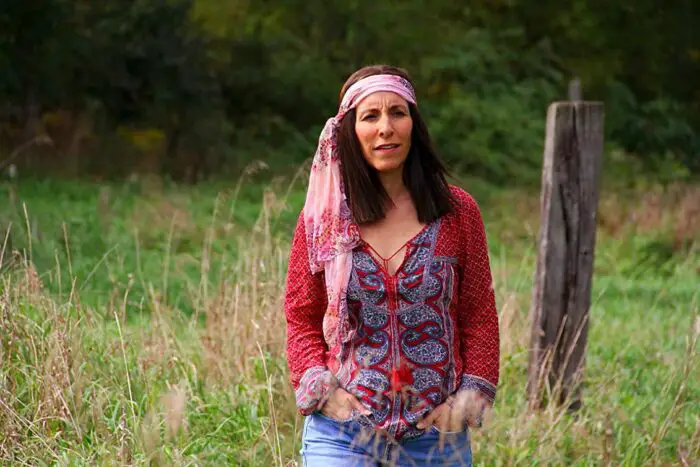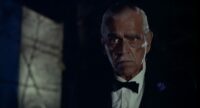Raunch and Roll was conceived and written as a play by Brendan Ragotzy from the acclaimed Barn Theatre in Augusta, Michigan, which, at 75 years old, is one of America’s longest-running regional theaters. The story, which examines the highs and lows of rock ’n’ roll, follows Roxy Starr (Penelope Alex), a rock singer who was huge in the 1980s and 90s, but who abandoned a stadium tour at the top of her game and hasn’t been heard from in almost 20 years. Fast-forward to the present day, and Roxy receives some devastating news. In response, she leaves her Malibu mansion and, along with her long-time manager, heads to the small Michigan town where it all began for her as a teenager.
Adapting this story from play to film is director Phil Wurtzel and his cast, featuring Alex, Tom Wopat, Michael Paré, William McNamara, Kristen Dalton, and Eric Petersen. Wurtzel spoke to us about the inception, making-of and reception to the film.
Jason: Can you tell us about what brought you to this specific career path?
Phil Wurtzel: During college, living out in Los Angeles, I got interested in the film business and started working in that industry for independent projects. Once I moved back to Michigan, I started producing and directing independent films.
Jason: What was it about filmmaking that you were attracted to?
Phil Wurtzel: I had very little contact with it growing up, except for going to see movies every once in a while. I was involved in a lot of sports. When I moved out to Los Angeles and went to college out there, I got involved in theater, and it struck a chord. It was fascinating for me. That event led me to film work, which is obviously very prevalent.
Jason: What is it about working in different genres that you enjoy?
Phil Wurtzel: I always enjoy thrillers and horror. As a kid growing up, those are the ones I was attracted to but when it came to this project, it was being done as a play at a local theater company. It’s a drama, and it involves the lead character, Roxy Starr, who is dying of cancer. That tied into a lot of things I was interested in. First was the fact that it was a theater, which is where I kind of got my start. Number two is, I’m friends with the executive producer who owns the theater company. And the final thing was, my father was diagnosed with cancer just before we started this project, and I wanted to tell the story also.

Jason: This project has an interesting inception, I guess you could say. Can you elaborate for people reading?
Phil Wurtzel: It does. The Barn Theatre is this little gem of a theater company in the Midwest and over the last 75 years, everybody from, you know, Jennifer Garner started there and Dana Delaney and Lauren Graham and Tom WoPat and on and on, especially in the 50s and 60s, when it was in its heyday. It was sending a lot of actors right to Broadway; they were getting their union or equity card at the bottom, so they were getting their union card and going right to Broadway and then eventually, obviously, more of them went to Los Angeles and got TV, but it’s been a training ground for years for a lot of name talent.
Jason: What do you think it is about the Barn Theatre that attracts this talent, and they later cherish the memories of?
Phil Wurtzel: I did a documentary on the theater ten years ago, so that’s how I actually got to know the owners better and really understood the whole system; why they’re so popular and why they’ve been so successful is that they are one of the few places that a young actor or actress can go and actually get real-life training and get paid. So they not only put them on stage, and really run them through the wringer on how the world works on Broadway, but they get paid to do it. And also they can get their union card by this process by putting in enough points or enough weeks into the system, I should say. They’re like the minor leagues in baseball to the major leagues.
Jason: How does this film differ from the play, if it differs at all?
Phil Wurtzel: The main story is the same, or main character’s journey, right? Our differences are that there is no fleshing out of secondary characters at all in the play. They were fairly cardboard in a way, not fleshed out. When we were able to film this, we really worked on digging into the secondary characters, especially her manager, and we fleshed his role out much more.

Jason: What was it about these characters that appeal to you, particularly the lead character, Roxy?
Phil Wurtzel: I’m a big fan of the 80s. Rock and roll like Pat Benatar, John Jett, And that’s Roxy. She is those singers, and 80s rock did a lot for female lead singers, but it was very much a male-dominated industry, so it’s fun to go back and really make this character the rock’n’roll goddess, they keep calling her (that) so that’s fun to play with, that whole notion of she’s the Pat Benatar or Joan Jett of her time.
Jason: That’s a great description of her. I understand filming proved a bit of a challenge at times. Can you elaborate?
Phil Wurtzel: It did. We had several actors that were set for it, and then their schedules fell apart. At one point we had Sherilyn Fenn, but then Twin Peaks was starting up. So we lost Sherilyn Fenn, who was going to play a secondary role. And it was a lot of juggling. It’s always like that with independent films because you’re always in second place when a bigger film or bigger studio project comes up. So we got great people. We had a lot of reshoots, though, because one of the problems with shooting a play is that you need to open up the story more when it’s a film because I have more locations and more cinematic things going on. We had to schedule pickup shots out in Los Angeles and other places. So the process of filming it actually took over a year.
Jason: Was that filming straight through, or did you stop and start and stop and start and stop?
Phil Wurtzel: Yeah, there was about, let’s see, at least four to five different stops and starts. We shot the main part of the movie in 2016 over a three-week period, (then) stopped and started on pickup shots over the next year after that.
Jason: You’ve worked with the same group of people now a number of times. How important is that, to work with the same people?
Phil Wurtzel: When you have so little time and very little money, it’s vital to complete the project. This is the same crew we’ve basically had for three different films now. So we’ve kind of got our groove going,
Jason: What was the first collaboration between you all like, compared to how you all work now?
Phil Wurtzel: We had a film called The Haunting in Cawdor that we shot at the Barn Theater, and that was the first film that not only did we shoot it at the Theatre, but we used many of the key cast crew that we now have used on these later projects.
Jason: What has the reception been to this film?
Phil Wurtzel: We’ve had good reviews, it got picked up for a theatrical run this past month. So it actually was out on VOD premium starting in June, and then it got picked up at a local theater for a one-week run. Reviews have been positive. I mean, we’re waiting for some more reviews to come in on it but so far, so good.
Jason: Now, hearing you talk about this film, what do you think its place is in an industry dominated by comic book movies? You don’t see a lot of these movies anymore, certainly not these little personal dramas.
Phil Wurtzel: These are tough movies to not only get funded but also to have them find a place. If it wasn’t for streaming, these films wouldn’t really probably get made anymore. When we first started with this project, I always had in my mind, it should be like The Rose with metal, that kind of journey with this lead female singer, but those movies hardly get made anymore. So this film, if you can find a little spot out there on Amazon, it’s been on the major cable channels and had a theatrical run. There’s no DVD out there except for Walmart now. So you’re going to find it on streaming and that’s the only place it is going to exist.

Jason: I hope people see it on streaming. I hope people see these little movies I grew up watching and loving. I love these, I guess you call them “little” movies. They’re not derogatory to call them that.
Phil Wurtzel: No, it’s not. Yeah, I agree.
Jason: Are there any interesting or exciting projects you’re working on?
Phil Wurtzel: We just, we just filmed a Thriller Horror movie called Dormant Evil, and I’d say it’s about America’s first serial killer, but it’s a fictional character that came of age in the 1880s and 1890s. We were able to shoot at a historical village and create this whole world of the turn of the century before Jack the Ripper. It’s an intriguing take on America’s first serial killer.
Jason: Is there anything else you’d like we didn’t touch on, or anything you’d like to say?
Phil Wurtzel: Only that if, if you’re a fan of adult drama, and you’d like a little 80s rock and roll, which we have a lot of original music written for this film — if you’re a fan of those two things, you could give Raunch and Roll a try on Amazon or wherever you can catch it.
Jason: On that little note, another question popped in my mind; how important was it to use original music and not rely on 80s standards?
Phil Wurtzel: It was critical because, number one, we couldn’t afford to license any recognizable songs. So what the executive producer did, he was the owner of the Barn Theatre, so his connections were with 80s rockers like Richard Marx and Fee Waybill, so he had those songwriters write original music for this movie.
Jason: I thank you for your time and for connecting with me and for making movies like these.
Phil Wurtzel: Thank you. I appreciate that.
Raunch and Roll is now available for streaming on Amazon Direct Video.



